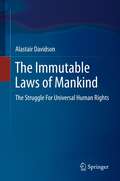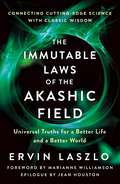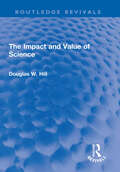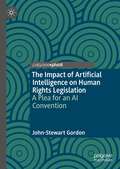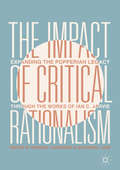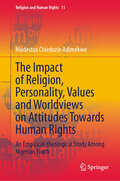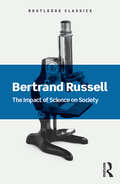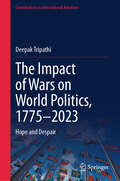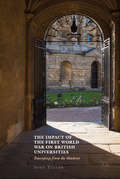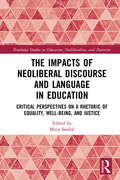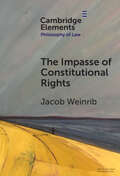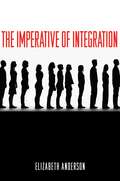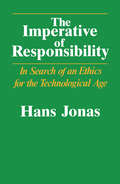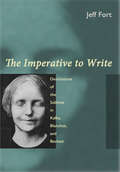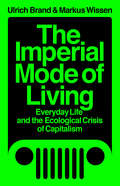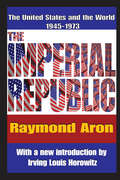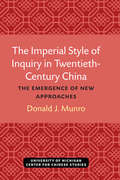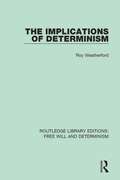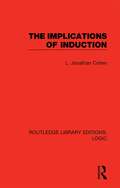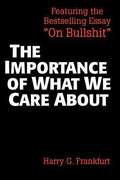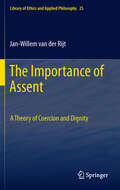- Table View
- List View
The Immutable Laws of Mankind
by Alastair DavidsonThe key question for the history of universal human rights is why it took so long for them to become established as law. The main theme of this book is that the attainment of universal human rights required heroic struggle, first by individuals and then by ever-increasing numbers of people who supported those views against the major historical trends. Universal human rights are won from a hostile majority by outsiders. The chapters in the book describe the milestones in that struggle. The history presented in this book shows that, in most places at most times, even today, for concrete material reasons a great many people oppose the notion that all individuals have equal rights. The dominant history since the 1600s has been that of a mass struggle for the national-democratic state. This book argues that this struggle for national rights has been practically and logically contradictory with the struggle for universal rights. It would only be otherwise if there were free migration and access to citizenship on demand by anybody. This has never been the case. Rather than drawing only on European sources and being limited to major literary figures, this book is written from the Gramscian perspective that ideas mean little until they are taken up as mass ideologies. It draws on sources from Asia and America and on knowledge about mass attitudes, globally and throughout history.
The Immutable Laws of the Akashic Field: Universal Truths for a Better Life and a Better World
by Ervin LaszloConnecting Cutting-Edge Science with Classical WisdomThe Akashic Field is a cosmic field in which all information and knowledge is interconnected and preserved. Our very reality is anchored in this vast sea of connected information that gives rise to everything—from specks of stardust in the outer cosmos to consciousness itself. In The Immutable Laws of the Akashic Field, Dr. Ervin Laszlo, renowned authority in the fields of new science, consciousness, and spirituality, has written an accessible introduction to the mysteries of the Akashic Field, explaining how leading science supports this ancient intuition of the deep reality of the universe. The Immutable Laws of the Akashic Field also features contributions from other leading voices, including Dr. Maria Sagi, Christopher M. Bache, and Kingsley L. Dennis along with a foreword by Marianne Williamson. This approachable text offers a brilliant introduction to and bold affirmation of one of the most profound wonders of our universe.
The Impact and Value of Science (Routledge Revivals)
by Douglas W. HillFirst published in 1945, The Impact and Value of Science is both a plea and a challenge: a plea for more and more science – not to increase the sum total of technical knowledge nor to extend present material amenities, but in the words of the author for the sake of "mental maturity." It is a challenge to try the method of science. Every man is a scientist and every scientist a useful citizen. Dr. Hill has been both an industrial and academic scientist but here he is concerned with something much wider than textbook conception of science. He gives a clear answer to those who argue that scientific progress is leading to man’s destruction by showing that if the scientific method is applied in "non-scientific" fields – in religion, ethics, politics – man will learn how to use the technical inventions of science as stepping stones in social and economic progress. With space tourism and climate crisis marking the two ends of scientific development in current times, this book is of value to everyone but especially to students of climate change, public policy and ethics.
The Impact of Artificial Intelligence on Human Rights Legislation: A Plea for an AI Convention
by John-Stewart GordonThe unmatched technological achievements in artificial intelligence (AI), robotics, computer science, and related fields over the last few decades can be considered a success story. The technological sophistication has been so groundbreaking in various types of applications that many experts believe that we will see, at some point or another, the emergence of general AI (AGI) and, eventually, superintelligence. This book examines the impact of AI on human rights by focusing on potential risks and human rights legislation and proposes creating a Universal Convention for the Rights of AI Systems (AI Convention).
The Impact of Critical Rationalism: Expanding the Popperian Legacy through the Works of Ian C. Jarvie
by Raphael Sassower Nathaniel LaorAs a student and disciple of Karl Popper and longtime managing editor of Philosophy of the Social Sciences, Ian C. Jarvie extended the notion of Critical Rationalism to be useful in anthropology, aesthetics, film studies, and various social sciences. In this Festschrift, contributors from a range of interests and disciplines engage with the Popperian legacy and Jarvie’s scholarly and editorial work in Critical Rationalism to contextualize it in the broader, contemporary intellectual landscape. These original essays not only honor Jarvie’s legacy, but expand it to cross the philosophical divide between analytic and continental schools of thought. In so doing, the authors bring the state-of-the-art achievements of Critical Rationalism to the forefront of current academic debates.
The Impact of Idealism: Aesthetics and Literature
by Nicholas Boyle Ian Cooper Liz Disley Christoph JammeThe first study of its kind, The Impact of Idealism assesses the impact of classical German philosophy on science, religion and culture. This volume explores German Idealism's impact on the literature, art and aesthetics of the last two centuries. Each essay focuses on the legacy of an idea or concept from the high point of German philosophy around 1800, tracing out its influence on the intervening period and its importance for contemporary discussions. As well as a broad geographical and historical range, including Greek tragedy, George Eliot, Thomas Mann and Samuel Beckett, and key musicians and artists such as Wagner, Andy Warhol and Frank Lloyd Wright, the volume's thematic focus is broad. Engaging closely with the key aesthetic texts of German Idealism, this collection uses examples from literature, music, art, architecture and museum studies to demonstrate Idealism's continuing influence.
The Impact of Idealism: Historical, Social and Political Thought
by Nicholas Boyle John Walker Liz DisleyThe first study of its kind, The Impact of Idealism assesses the impact of classical German philosophy on science, religion and culture. This volume explores German Idealism's impact on the historical, social and political thought of the nineteenth, twentieth and twenty-first centuries. Each essay focuses on an idea or concept from the high point of German philosophy around 1800, tracing out its influence on the intervening period and its importance for contemporary discussions. New light is shed on key developments of Idealist thought, such as Marxism, critical theory and feminism, and previously unexamined areas of Idealism's influence are discussed for the first time. This unique, interdisciplinary collection traces the impact of Kant, Hegel, Schelling, Fichte and others in Britain, Europe, North America and beyond. Its insights represent vital contributions to their respective fields, as well as to our understanding of German Idealism itself.
The Impact of Idealism: Philosophy and Natural Sciences
by Nicholas Boyle Karl Ameriks Liz DisleyThe first study of its kind, The Impact of Idealism assesses the impact of classical German philosophy on science, religion and culture. This volume explores German Idealism's impact on philosophy and scientific thought. Fourteen essays, by leading authorities in their respective fields, each focus on the legacy of a particular idea that emerged around 1800, when the underlying concepts of modern philosophy were being formed, challenged and criticised, leaving a legacy that extends to all physical areas and all topics in the philosophical world. From British Idealism to phenomenology, existentialism, pragmatism and French postmodernism, the story of German Idealism's impact on philosophy is here interwoven with man's scientific journey of self-discovery in the nineteenth and early twentieth centuries - from Darwin to Nietzsche to Freud and beyond. Spanning the analytical and Continental divide, this first volume examines Idealism's impact on contemporary philosophical discussions.
The Impact of Idealism: Religion
by Nicholas Boyle Nicholas Adams Liz DisleyThe first study of its kind, The Impact of Idealism assesses the impact of classical German philosophy on science, religion and culture. This volume explores German Idealism's impact on theology and religious ideas in the nineteenth, twentieth and twenty-first centuries. With contributions from leading scholars, this collection not only demonstrates the vast range of Idealism's theological influence across different centuries, countries, continents, traditions and religions, but also, in doing so, provides fresh insight into the original ideas and themes with which Kant, Hegel, Fichte, Schelling and others were concerned. As well as tracing out the Idealist influence in the work of nineteenth and twentieth-century theologians, philosophers of religion, and theological traditions, from Schleiermacher to Karl Barth to Radical Orthodoxy, the essays in this collection bring each debate up to date with a strong focus on Idealism's contemporary relevance.
The Impact of Religion, Personality, Values and Worldviews on Attitudes Towards Human Rights: An Empirical-theological Study Among Nigerian Youth (Religion and Human Rights #11)
by Modestus Chiedozie AdimekweThis book provides a rigorous investigation into the adoption and culture of human rights in Nigeria, with a focus on the human rights attitudes of Nigerian students. Exploring the perceived paradox of enthusiastic endorsement of human rights instruments and their poor application in Nigeria, the author uses an empirical-theological research design to understand how young people in Nigeria evaluate human rights and which factors trigger their evaluation. In doing so, this book is the first to empirically examine the predictors of human rights attitudes among Nigerians and provides new insights into the degree of social significance of the religiosity of adolescents in the country. It also offers a compelling quantitative analysis differences in human rights attitudes among Nigerian youth along religious lines. Given the importance of a culture of human rights in our increasingly diverse societies and the salience of religion on this matter in Nigeria, and across the Africancontinent, this book provides a valuable perspective on the interrelationships between religion, value orientations, personality traits, socio-political context, and human rights. Being concerned with the future of human rights in Nigeria, the author argues that it is crucial to understand ‘the religious factor’ among Nigerian students today. This book is therefore recommended to educators, especially teachers of Religion Education, and scholars working in educational settings, but will also be of interest to researchers in social sciences, public administrators, and policymakers.
The Impact of Science on Society (Routledge Classics)
by Bertrand RussellMany of the revolutionary effects of science and technology are obvious enough. Bertrand Russell saw in the 1950s that there are also many negative aspects of scientific innovation. Insightful and controversial in equal measure, Russell argues that science offers the world greater well-being than it has ever known, on the condition that prosperity is dispersed; power is diffused by means of a single, world government; birth rates do not become too high; and war is abolished. Russell acknowledges that is a tall order, but remains essentially optimistic. He imagines mankind in a 'race between human skill as to means and human folly as to ends', but believes human society will ultimately choose the path of reason. This Routledge Classics edition includes a new Preface by Tim Sluckin.
The Impact of Wars on World Politics, 1775–2023: Hope and Despair (Contributions to International Relations)
by Deepak TripathiIn a study of cyclical history, this book presents a grand sweep of modern history and how decades of savage wars, and turbulence, led to a brief era of exhilaration and hope, followed by despair in the new century. The collapse of the Berlin Wall (1989) and the Soviet Union (1991), marking the end of the Cold War, were celebrated with great euphoria. The book points out that the defeat of Soviet communism by the Western allies was one of the most consequential outcomes of great power conflict in the twentieth century, comparable to the defeat of fascism in the Second World War, and of the Central Powers led by Germany and Austria-Hungary in the First World War. However, optimistic predictions of a peaceful and orderly world after the Cold War proved wrong, and new challenges emerged across the globe such as international and regional conflicts, climate change, and mass migration. The book explains how the initial excitement and hope after the collapse of the Soviet Union turned to new challenges, and despair, continuing the cycle of history. Tripathi's scholarly rigor, combined with his journalistic clarity, makes this book a landmark publication that stands out for its depth, relevance, and the urgent message it conveys about the necessity of learning from history to navigate the challenges of the future. Ashok Swain, Professor & Head, Department of Peace and Conflict Research, Uppsala University This book is a strong, well-written, and explorative testimony of war and conflict, their roots and dynamics, as well as consequences and impact on politics and human lives. Nora Sveaass, Professor Emeritus, Department of Psychology, University of Oslo
The Impact of the First World War on British Universities: Emerging from the Shadows
by John TaylorThe First World War had innumerable consequences for all aspects of society; universities and education being no exception. This book details the myriad impacts of the war on British universities: telling how universities survived the war, their contribution to the war effort and the changes that the war itself brought about. In doing so, the author highlights the changing relationship between universities and government: arguing that a transformation took place during these years, that saw universities moving from a relatively closed world pre-1914 to a more active and open role within the national economy and society. The author makes extensive use of original documentary material to paint a vivid picture of the experiences of British universities during the war years, combining academic analysis with contemporary accounts and descriptions. This uniquely researched book will appeal to students and scholars of the history of higher education, social history and the First World War.
The Impacts of Neoliberal Discourse and Language in Education: Critical Perspectives on a Rhetoric of Equality, Well-Being, and Justice (Routledge Studies in Education, Neoliberalism, and Marxism)
by Mitja SardočThis edited collection combines quantitative content and critical discourse analysis to reveal a shift in the rhetoric used as part of the neoliberal agenda in education. It does so by analysing, uncovering, and commenting on language as a central tool of education. Focussing on vocabulary, metaphors, and slogans used in strategy documents, advertising, policy, and public discourse, the text illustrates how concepts such as justice, opportunity, well-being, talent, and disadvantage have been hijacked by educational institutes, governments, and universities. Showing how neoliberalism has changed discourses about education and educational policy, these chapters trace issues such as anti-intellectualism, commercialization, meritocracy, and an erasure of racial difference back to a contradictory growth in egalitarian rhetoric. Given its global scope, this volume offers a timely intervention in the studies of neoliberalism and education by developing a holistic vision of how the language of neoliberalism has changed how we think about education. It will prove to be an essential resource for scholars and researchers working at the intersections of education, policymaking, and neoliberalism.
The Impasse of Constitutional Rights (Elements in Philosophy of Law)
by Jacob WeinribConstitutional rights are often seen as invitations to engage in all things considered moral reasoning about how public authorities should act. The Impasse of Constitutional Rights challenges this widely accepted view by showing that it generates an irresolvable deadlock between rival theories of constitutional rights that share the same defects. This Element develops the alternative idea that rights-based constitutional order has its own distinctive moral project, which consists in rendering public authority accountable to the inherent rights of each legal subject. Taking this project seriously requires reconceiving the basic building blocks of rights-based constitutional order: justification, purposive interpretation, and proportionality. The resulting account both escapes the impasse to which the leading contemporary theories of constitutional rights succumb and expounds the normative connection between rights-based constitutional order and its most fundamental doctrines.
The Imperative of Integration
by Elizabeth AndersonA powerful new argument for reviving the ideal of racial integrationMore than forty years have passed since Congress, in response to the Civil Rights Movement, enacted sweeping antidiscrimination laws in the Civil Rights Act of 1964, the Voting Rights Act of 1965, and the Fair Housing Act of 1968. As a signal achievement of that legacy, in 2008, Americans elected their first African American president. Some would argue that we have finally arrived at a postracial America, but The Imperative of Integration indicates otherwise. Elizabeth Anderson demonstrates that, despite progress toward racial equality, African Americans remain disadvantaged on virtually all measures of well-being. Segregation remains a key cause of these problems, and Anderson skillfully shows why racial integration is needed to address these issues. Weaving together extensive social science findings—in economics, sociology, and psychology—with political theory, this book provides a compelling argument for reviving the ideal of racial integration to overcome injustice and inequality, and to build a better democracy.Considering the effects of segregation and integration across multiple social arenas, Anderson exposes the deficiencies of racial views on both the right and the left. She reveals the limitations of conservative explanations for black disadvantage in terms of cultural pathology within the black community and explains why color blindness is morally misguided. Multicultural celebrations of group differences are also not enough to solve our racial problems. Anderson provides a distinctive rationale for affirmative action as a tool for promoting integration, and explores how integration can be practiced beyond affirmative action.Offering an expansive model for practicing political philosophy in close collaboration with the social sciences, this book is a trenchant examination of how racial integration can lead to a more robust and responsive democracy.
The Imperative of Responsibility: In Search of an Ethics for the Technological Age
by Hans JonasHans Jonas here rethinks the foundations of ethics in light of the awesome transformations wrought by modern technology: the threat of nuclear war, ecological ravage, genetic engineering, and the like. Though informed by a deep reverence for human life, Jonas's ethics is grounded not in religion but in metaphysics, in a secular doctrine that makes explicit man's duties toward himself, his posterity, and the environment. Jonas offers an assessment of practical goals under present circumstances, ending with a critique of modern utopianism.
The Imperative to Write: Destitutions of the Sublime in Kafka, Blanchot, and Beckett
by Jeff FortIs writing haunted by a categorical imperative? Does the Kantian sublime continue to shape the writer’s vocation, even for twentieth-century authors? What precise shape, form, or figure does this residue of sublimity take in the fictions that follow from it—and that leave it in ruins?This book explores these questions through readings of three authors who bear witness to an ambiguous exigency: writing as a demanding and exclusive task, at odds with life, but also a mere compulsion, a drive without end or reason, even a kind of torture. If Kafka, Blanchot, and Beckett mimic a sublime vocation in their extreme devotion to writing, they do so in full awareness that the trajectory it dictates leads not to metaphysical redemption but rather downward, into the uncanny element of fiction. As this book argues, the sublime has always been a deeply melancholy affair, even in its classical Kantian form, but it is in the attenuated speech of narrative voices progressively stripped of their resources and rewards that the true nature of this melancholy is revealed.
The Imperial Mode of Living: Everyday Life and the Ecological Crisis of Capitalism
by Ulrich Brand Markus WissenOur Unsustainable Life: Why We Can't Have Everything We WantWith the concept of the Imperial Mode of Living, Brand and Wissen highlight the fact that capitalism implies uneven development as well as a constant and accelerating universalisation of a Western mode of production and living. The logic of liberal markets since the 19thCentury, and especially since World War II, has been inscribed into everyday practices that are usually unconsciously reproduced. The authors show that they are a main driver of the ecological crisis and economic and political instability.The Imperial Mode of Living implies that people's everyday practices, including individual and societal orientations, as well as identities, rely heavily on the unlimited appropriation of resources; a disproportionate claim on global and local ecosystems and sinks; and cheap labour from elsewhere. This availability of commodities is largely organised through the world market, backed by military force and/or the asymmetric relations of forces as they have been inscribed in international institutions. Moreover, the Imperial Mode of Living implies asymmetrical social relations along class, gender and race within the respective countries. Here too, it is driven by the capitalist accumulation imperative, growth-oriented state policies and status consumption. The concrete production conditions of commodities are rendered invisible in the places where the commodities are consumed. The imperialist world order is normalized through the mode of production and living.
The Imperial Republic: The United States and the World 1945-1973
by Irving HorowitzThe Imperial Republic based as it is on Raymond Aron's realist philosophy, is involved only indirectly or by implication in the disputes about moralism, revisionism, and even imperialism. Its main aim is to account for the diplomacy of the United States as it was in a special time period. Like all diplomacy, it can be explained only within the system of inter-state relations to which the protagonist belongs.United States diplomacy during the twenty- eight year period of 1945-73 is examined from strategic, political, and moral stand points were in diplomats openly declared their aim, and did they achieve it? Does the result justify accusations either of incompetence or of imperialism? Does not the reaction within the United States to a policy which had been a striking success now induce second thoughts about both the policy and its results? The imperial republic is trying to throw off its burden; once a missionary, it has lost the sense of mission; it is still capitalist, but its spoiled children no longer believe in money; it was puritan, but its cities abound in sex shops; it regards itself as scientific, yet mystical and nudist sects are common.The reader is not asked to endorse Aron's paradoxical interpretations, but to try to discover the reasons for any disagreement he may feel regarding differences in political judgment. People who have acquired the habit of thinking of the contemporary world in Manichaean terms-in terms of the reduction of whole populations to slavery by monsters, or in terms of capitalism, imperialism, or revisionism- may be out raged by a book that is not concerned with grounds for outrage and in which there are neither villains nor heroes; but rather with mixed messages by decent policymakers. At the time of its initial publication The Times Literary Supplement called The Imperial Republic "an important book . . . no other author does so much." It remains so!
The Imperial Style of Inquiry in Twentieth-Century China: The Emergence of New Approaches (Michigan Monographs In Chinese Studies #72)
by Donald J. MunroHow have traditional Chinese ways of thinking affected problem solving in this century? The traditional, imperial style of inquiry is associated with the belief that the universe is a coherent, internally structured unity understandable through the similarly structured human mind. It involves a reliance on antecedent and authoritarian models, coupled with an introspective focus in investigations, at some cost to objective fact gathering. In contrast, emergent forms of inquiry are guided by the values of individual autonomy and new perspectives on objectivity. In the 1930s and 1940s, some liberal educators held the model of Western science in great esteem, and some scientists practicing objective inquiry helped to create an awareness in the urban areas of inquiry not directed by political values. Drawing on philosophical, social science, and popular culture materials, Donald Munro shows that the two strains coexisted in twentieth century China as mixed motives. Many important figures were motivated by a desire to act consistently with the social values associated with the premodern or received view of knowledge and inquiry. At the same time, these people often had other motives, such as utilitarian values, efficiency, and entrepreneurship. Munro argues that while many competing positions can coexist in the same person, the seeds of the positive, instrumental value of individual autonomy in Chinese inquiry are beginning to compete in both scholarly and popular culture with other, older approaches.
The Implications of Determinism (Routledge Library Editions: Free Will and Determinism #8)
by Roy WeatherfordThe problem of determinism arises in all the major areas of philosophy. The first part of this book, first published in 1991, is a critical and historical exposition of the problem and the most important ideas and arguments which have arisen over the many years of debate. The second part considers the various forms of determinism and the implications that they engender.
The Implications of Induction (Routledge Library Editions: Logic)
by L. Jonathan CohenOriginally published in 1973. This book presents a valid mode of reasoning that is different to mathematical probability. This inductive logic is investigated in terms of scientific investigation. The author presents his criteria of adequacy for analysing inductive support for hypotheses and discusses each of these criteria in depth. The chapters cover philosophical problems and paradoxes about experimental support, probability and justifiability, ending with a system of logical syntax of induction. Each section begins with a summary of its contents and there is a glossary of technical terms to aid the reader.
The Importance Of What We Care About: Philosophical Essays
by Harry G. FrankfurtThis volume is a collection of thirteen seminal essays on ethics, free will, and the philosophy of mind. The essays deal with such central topics as freedom of the will, moral responsibility, the concept of a person, the structure of the will, the nature of action, the constitution of the self, and the theory of personal ideals. By focusing on the distinctive nature of human freedom, Professor Frankfurt is ale to explore fundamental problems of what it is to be a person and of what one should care about in life.
The Importance of Assent
by Jan-Willem Van der RijtThe view that persons are entitled to respect because of their moral agency is commonplace in contemporary moral theory. What exactly this respect entails, however, is far less uncontroversial. In this book, Van der Rijt argues powerfully that this respect for persons' moral agency must also encompass respect for their subjective moral judgments - even when these judgments can be shown to be fundamentally flawed. Van der Rijt scrutinises the role persons' subjective moral judgments play within the context of coercion and domination. His fresh, original analysis of Kant's third formulation of the Categorical Imperative reveals how these judgments are intimately connected to a person's dignity. The result is an insightful new account of coercion, a novel Kantian reformulation of the republican notion of non-domination and a compelling, innovative argument in favour of retributive justice. "In this admirably clear and insightful work, Van der Rijt develops an original account of coercion and dignity. On the basis of his analysis of the relation between these two concepts, he also provides an intriguing new angle on the nature of republicanism. I recommend this book to anyone interested in freedom and power and their roles in normative political theory." Ian Carter - University of Pavia "In this carefully argued and original study Jan-Willem van der Rijt offers an analysis of coercion, a broadly Kantian argument that coercion is an affront to dignity, and an illuminating contrast with Philip Pettit's republicanism. A most welcome contribution." Thomas E. Hill, Jr. - University of North Carolina at Chapel Hill "Jan-Willem van der Rijt has written a well argued, original book that will prove to be extremely helpful for the philosophical inquiry of the relationship between coercion and human dignity as well as for the assessment of republicanism and its consequences." Ralf Stoecker - University of Potsdam
